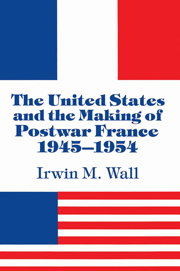Book contents
- Frontmatter
- Contents
- Acknowledgments
- List of abbreviations
- Introduction
- 1 The diplomatic heritage
- 2 The postwar years: Independence compromised
- 3 L'année terrible
- 4 Americanizing the French
- 5 Building an alliance
- 6 The Marshall Plan
- 7 Military aid and French independence
- 8 The United States and French Indochina
- 9 France declares its independence
- Conclusion
- Bibliography
- Index
2 - The postwar years: Independence compromised
Published online by Cambridge University Press: 04 December 2009
- Frontmatter
- Contents
- Acknowledgments
- List of abbreviations
- Introduction
- 1 The diplomatic heritage
- 2 The postwar years: Independence compromised
- 3 L'année terrible
- 4 Americanizing the French
- 5 Building an alliance
- 6 The Marshall Plan
- 7 Military aid and French independence
- 8 The United States and French Indochina
- 9 France declares its independence
- Conclusion
- Bibliography
- Index
Summary
ECONOMIC DEPENDENCE AND POLITICAL DISCORD
French Foreign Policy in the years immediately after the war was based on an apparently unresolvable contradiction. Security needs dictated the pursuit of policies designed to obtain the political disunity of Germany and its future economic weakness vis-à-vis a restored France. French economic realities – the severe economic dislocation, disruption, and absolute deprivation caused by the war – dictated a policy of dependence on the United States. The United States alone could provide the imports France needed to maintain a minimum level of subsistence while attempting to reconstruct and modernize its economy. But the price of American assistance soon revealed itself to be French acquiescence in the reconstruction of Germany. At the war's end American policy toward Germany remained fluid, and the widespread belief in both France and the United States in the continued cordiality of relations between the Soviet Union and the West, permitted the French to mask this contradiction. France persisted in the belief that it could pursue its security needs despite its economic dependence on the United States. As American suspicion of Russia grew, however, the traditional American conviction of its need for a strong Germany in Europe as a trading partner reasserted itself, and the French found it increasingly difficult to continue pursuing German weakness and American credits simultaneously.
- Type
- Chapter
- Information
- Publisher: Cambridge University PressPrint publication year: 1991

